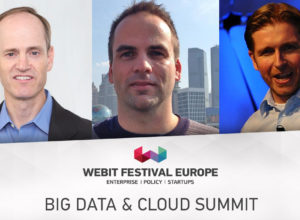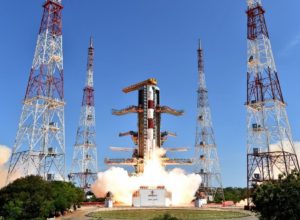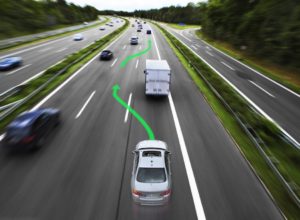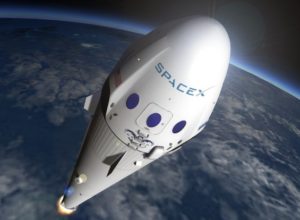Tag: Industry
Webit.Festival will show you how Big Data and Cloud Services are...
We are standing at the start of a giant transformation, that will change every business and aspect of our lives. In the past two years the world has created more data than in the entire previous history of human race.
According to EMC study, the data volumes are growing so fast, that by the end of 2020 we will create 1.7 megabytes of new information every second. By then our digital storage will grow from 4.4 zettabytes today to around 44 zettabytes, or 44 trillion gigabytes.
Right now the Big Data market worldwide stands around $7.6 trillion, which is bigger than the whole fuel industry. This is the reason many experts said that data has finally become the new oil of the world.
In the next few years we expect the number of connected devices worldwide to reach more than 34 billion. This news is more than welcome for the business, because all the gathered information will completely change the way enterprises approach their customers.
The expanding big data comes with adoption of cloud technology and online delivery of hosted services. This enables companies to consume a computing resources, such as virtual machine or storage, rather than having to build and maintain their own computing infrastructures. In 2016 the spending on public cloud infrastructure reached $38 billion, while Forbes predicts that it will grow to $173 billion in 2026.
At this year’s Webit.Festival you can listen to some of the top experts in those innovative fields of digital industry. During the Big Data & Cloud Summit they will share their thoughts on the development of IoT, Artificial Intelligence, Cloud Technology and convergence of cognitive and cloud security as a business enabler.
The Vice President of Cloud and Mobile Technology Strategy at IBM Jonas Jacobi will talk about the power of the combination between AI and IoT and how it will impact our daily lives - both personal and professional.
Meanwhile, the Community Director and Technology Evangelist at TIBCO Kai Waehner will tell the audience about the latest trends in Cloud Native Architectures, Hybrid Integration Platforms and Microservices. He will also talk about Big Data Analytics, Machine Learning and Real Time Event Processing.
IBM’s Chief Information Officer on Cloud & SaaS Operational Services David Cass will explain some of the fundamental digital changes that the world is going through and how the use of Cognitive and Cloud is helping businesses transform themselves and deliver insights not previously available to them.
The CEO and Co-Founder of Resillo Inc. Eric Klinker will share his global forecast for edge computing and will explain why the rapid scaling of systems across every conceivable industry will not accommodate traditional thinking or traditional architectures.
Is automation the developer’s nightmare or a much needed help
The fourth industrial revolution has already led to transformations that alter our way of life fundamentally. But perhaps the most important of them all is the change in the labour market, which affects hundreds of jobs and can become a challenge even for the most sought ones - the developers.
Recent study, conducted by the Oxford University, showed that 47% of jobs in the United States are at risk of being automated in the next two decades. But according to McKinsey Global Institute, only 5% of all occupations are at risk of being entirely automated.
Rather than disappearing, the report’s authors say, jobs will change dramatically, forcing workers to adapt. McKinsey’s analysis of 800 occupations and 2,000 job tasks predicts that half of workers’ current tasks could be automated by the year 2055 using technology that currently exists.
The experts think that those changes will not lead to mass unemployment. Instead, the automation could increase global productivity by 0.8% to 1.4% annually over the next 50 years.
Those jobs are not only in the manufacturing sector, where robots will soon be doing almost every task. Today we can see the automation slowly taking over many white collar occupations, and this is just the beginning.
Industry data show that enterprises are investing more money in platforms, tools and automated processes and less in manual professional services. Eventually experts predict that robots or robo-software will replace developers and will prove to be the only solution able to support the increasing demand.
The CEO of Zuznow mobile development platform Chen Levkovich told Venture Beat that while many developers oppose automation, the new tools can help them become more efficient.
Last November Forbes reported that the custom software development company Dev9 is using artificial intelligence to eliminate strenuous processes and drastically reduce manual overhead.
Using teams of 3 to 8 people, with expertise ranging from architecture, development, project management, quality and deployment, Dev9 develops original technology that rapidly, reliably and repeatedly pushes software enhancements and bug fixes to customers at a low risk.
To learn more about the future of software development and DevOps, join the Dev Summit within Webit.Festival. On the scene you’ll see and hear top level speakers, such as the Founder and CTO of Maria DB Foundation Michael “Monty” Widenius, the Founder and CTO of Hired Allan Grant, and the Developer Evangelist in Amazon Peter Heinrich.
India reaches to the stars with the launching of 104 satellites...
Aerospace industry worldwide is experiencing a renaissance, but unlike the space race years during the Cold War, now the innovations come not only from American and Russian government agencies, but also from emerging economies like India.
Just yesterday the Asian country made history by successfully launching 104 satellites on a single mission, surpassing the previous record of 37 satellites, launched by Russia 3 years ago.
Experts say this is a sign that India is emerging as a major player in the multi-billion dollar space market, while the Prime Minister of the country Narendra Modi was among the first to congratulate the team behind the effort. He tweeted that this is another proud moment for the nation’s scientific community.
The main task of the launch was to get the Cartosat-2 Earth-observation satellite in orbit. It is expected to be used for monitoring of India's local rivals - Pakistan and China. The other 103 spacecraft were nanosatellites, provided by countries like Israel, Kazakhstan, the Netherlands, Switzerland, the United Arab Emirates and the United States. 88 of them are owned by the San Francisco company Planet (ex Planet Labs). Their dimensions are just 30 by 10 by 10 centimeters, while their weight is about 4.5 kilograms. Despite the small size, they have sharp vision and can observe the Earth surface with precision. During the last year’s Webit.Festival in Sofia the European Space Agency (ESA) engineer and coordinator Lluc Diaz spoke about the institution’s mutual work with startups, like Planet Labs. The expert explained the benefits from launching small communication satellites, that cost between $10 and $100 million, unlike the big ones for $500 million. The small devices are easier to maintain and can be replaced with new ones when they are hit by space junk for example. Last year 210 satellites weighing less than 50 kilograms were launched this year to do such things as map the Earth, expand broadband access and track packages on shipping vessels. Тhat is up from just 25 launches in 2010. The 2016 number is expected to double in the next five years. If you want to keep up with the hottest trends in the space industry Webit.Festival is the right place for you. During the event, you can find out more about the future of exploration of the Universe from top level speakers, likе the Chairman of Breakthrough Prize Foundation Simon P. Worden. The author of more than 150 scientific papers in astrophysics space sciences and strategic studies will talk about the search of life beyond the Earth and deep space traveling.This remarkable feat by @isro is yet another proud moment for our space scientific community and the nation. India salutes our scientists.
— Narendra Modi (@narendramodi) February 15, 2017
VR and AR are on their way to becoming a $120...
The tech industry, social media, marketing and entertainment in the next few years will all be shaped by the development of virtual and augmented reality and the emergence of artificial intelligence.
This industry will finally rid us of two-dimensional monitors, which for several decades played the role of a window into the virtual reality.
Experts predict that by 2020 the VR hardware market size will reach $5.2 billion, while the VR software market will be around $24.5 billion. In 2016 the worldwide sales of VR head-mounted displays were for just $1.43 million. Polls show that 44% of the people with access to internet are very interested in virtual reality.
The AR market can grow from nearly zero today to $90 billion by 2020. And half of that revenue is going to come from sales of AR hardware devices. By the end of this year worldwide AR headset sales could hit $1.2 billion. This will be perfect for Microsoft, which started selling the developer version of the mixed reality device HoloLens last year.
In 2017 we expect a huge splash by the wireless virtual reality tech. This whole process started with Apple’s adoption of new Bluetooth standard in the iPhone 7 and 7S and now we are going to see products in different categories.
The Taiwanese manufacturer of Android and Windows smartphones HTC is already taking pre-orders for a $220 add-on that cuts the cables of the headset Vive and transform it into a wireless device.
Today Facebook CEO Mark Zuckerberg showed to the world a new prototype for VR gloves, that he tested during his tour inside Oculus Research facility.
“We’re working on new ways to bring your hands in virtual and augmented reality. Wearing these gloves, you can draw, type on a virtual keyboard, and even shoot webs like Spider-Man. That’s what I’m doing here”, he wrote on his profile in the social network.
Earlier this week Google revealed its plan to bring virtual reality into the web with the new mobile browser support for WebVR in Chrome. Now the browser allows users to navigate through webpages using their fingers or mouse on desktop PC.
If you want to keep up with the hottest trends in the world of virtual and augmented reality Webit.Festival is the right place for you. During our summits, you can listen to top level speakers such as the Partner in IBM Ventures Christoph Auer-Welsbach, the VP & CTO of VMware for EMEA region Joe Baguley and the General Manager of PlayFab for Europe Mark Val.
The future of cars is green, shared and autonomous
The debate about self-driving cars is already over. They are coming and the important question is who is going to build them first and how they will be regulated.
Nowadays there are more than 20 companies, from traditional giants in the automotive industry to new startups, who are trying to build autonomous car by the beginning of the new decade. And hundreds of others, who work on creative solutions for the new opportunities, that the self-driving cars present.
The dedication of Tesla’s CEO Elon Musk to developing autonomous vehicles is not new. But as the company is now testing its self-driving cars on public roads in California the idea is looking more like reality, than just a project.
But before we get to the implementation of this fascinating technology, we must look at changing need of car ownership. According to KPMG’s study 59% of industry bosses believe that more than half of all car owners today will no longer want to own a car by 2025.
The automation systems of the future will empower us to make the choice whether to drive on our own, or enjoy our automobile journeys as passengers. And instead of today’s car ownership model, we will most probably rely on the idea of mobility as a service by the end of the next decade.
And while most of us imagine that the future of automotive industry is fully committed to the electricity, the senior director of NVIDIA Danny Shapiro does not agree with this statement.
“We have a projection that by 2025, globally 15% of vehicles are going to have an electric component, whether that’s a pure electric vehicle, a plug-in hybrid or full hybrid. For western Europe, that percentage would obviously be higher”, Shapiro said in an interview for The Guardian.
He thinks that the huge oil infrastructure worldwide and the pro-oil administration in the United States in the next four years will slow down this process, or at least divert it to development of hybrid engines.
Meanwhile Japanese government is subsidising automakers, that create cars with hydrogen fuel cells, but the lack of infrastructure to support this new kind of fuel consumption will delay their implementation.
The common thing between all this technologies is the aim to transform the transportation into a more eco-friendly industry and lower its harmful emissions in line with the commitments in the Paris climate agreement, reached in the end of 2015.
If you want to keep up with the hottest trends in the world of mobility Webit.Festival is the right place for you. During our summits, you can listen to top level speakers such as the Director for International Transportation and Government in Xerox Richard Harris and the Managing Partner at New Mobility World Alexander Renz.
Private sector is driving the new age of space exploration
History of the human race is full of stories of amazing leaps, from migrating out of Africa to landing our spacecrafts on other planets and even asteroids. Nearly 50 years after first human steps on the Moon the space industry is completely different, than it was in the 20th century.
Contrary to perceptions, space industry is extremely traditional because of the high costs and need of minimal risk. But now private companies are beginning to take the initiative and to change our ideas about space as a place, reserved for government agencies.
There was a time when NASA and Roskosmos were the two main engines of our dreams for space exploration. But over the last 15 years that has changed with tens of space companies entering the market with serious plans for building rockets and colonizing new world.
Today almost everyone is aware of Virgin Galactic, SpaceX and Blue Origin, mostly due to the popularity of their celebrity entrepreneur owners. If their efforts for creating a reusable booster succeeds, this can lower the costs for space launch with as much as 60%.
And this is not even the whole picture. Hundreds of small startups have popped up for the new space race. Companies like Astrobotics are charging $1.2 million per kilo to take your stuff to the moon, while experts in Saber Aeronautics are using video game tech to help you create missions and operate satellites with minimum training.
During last year’s Webit.Festival in Sofia the project coordinator and engineer at European Space Agency (ESA) Lluc Diaz explained that because of the numerous private initiatives mankind is starting to look for the exploration of deep space.
In Europe, all this is happening not only with private capital, but through programs for public-private partnerships. Right now ESA is working with more than 400 startups, helping them with expert knowledge about implementation of space tech in our everyday life.
Great example of this kind of partnership is the success of companies like Planet Labs, that creates smaller and cheaper satellites that are easier to launch in space.
This year on Webit.Festival you can find out more about the future of space industry and exploration of the Universe from top level speakers, likе the Chairman of Breakthrough Prize Foundation Simon P. Worden.
The author of more than 150 scientific papers in astrophysics space sciences and strategic studies will talk about the search of life beyond the Earth and deep space traveling.
Industry’s biggest are betting on AI for smarter and safer transport
This year everyone will keep talking about Artificial Intelligence, but the industry that is most likely to benefit quick from the development of this amazing technology is transportation. In fact Mobility is the hot word for business all over the world, mainly because the transport cost is a main part of the price mix of almost every product on the market.
During the last year many of the big players in the automotive industry followed Tesla’s and Google’s example and announced their big plans for applying AI in the new models, mostly by building systems for autonomous driving and in-car entertainment.
The concept of self-driving cars is going to totally transform the whole transport sector, mainly through getting the driver out of the equation - both in the sphere of personal and enterprise vehicles. In turn this will change the overall user experience in the automobile and enable owners to make greater use of their connected cars.
This process is about to add the hours spent driving to our free time and develop entirely new industry of automotive entertainment. The news are well received by the electronic sport companies and the whole video game sector.
Of course the change is beneficial not only for the entertainers, but also for the sellers.
Last week BMW has teamed with Accenture to build an augmented “car visualiser” that is using Google’s Tango technology to show full-scale virtual versions of the i3 and i8 models. The clients in the company’s showrooms can enter the simulator and customize the whole interior and exterior of the car, so that they can order a personalized version of it.
The innovative devices will be piloted across BMW dealerships this year and if the marketing department of the company determines that the project is successful, it will be deployed on larger scale.
Meanwhile, the computer giant Nvidia revealed a powerful system that gives cars the ability to drive themselves. First part of the project is named Co-Pilot and is built as an AI assistant to drivers. It takes data from sensors in and outside of the vehicle through cameras and microphones and creates a profile of the surroundings. The assistant will notify the driver when he needs to react on a situation via voice signals and other means.
Nvidia already announced new partners for bringing autonomous vehicles to public roads. The company is working with Audi for embedding its AI tech in the new model’s hardware and software by 2020. The automaker’s ambition is to build not only smarter, but a safer vehicle for its customers.
If you want to keep up with the latest trends in mobility, personal and corporate transportation and their application in business and the smart cities of the future come, then Webit.Festival 2017 is the right place for you.
In the Enterprise section of the event you can listen to speakers like the Managing Partner at New Mobility Consulting, Alex Renz, who is helping corporations, startups and investors take advantage of the opportunities emerging from the digital transformation of transportation and mobility. Among the other confirmed speakers is the Managing Director of Startupbootcamp Smart Transportation & Energy Tanja Kufner.






